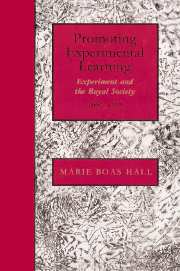Book contents
- Frontmatter
- Contents
- List of figures
- Preface
- A note on dates
- 1 Introductory
- 2 Aims and ideals
- 3 The record of the minutes 1660–1674
- 4 The communication of experiment 1660–1677
- 5 The record of the minutes 1674–1703
- 6 The communication of experiment 1677–1803
- 7 The record of the minutes 1703–1727
- 8 The communication of experiment 1703–1727
- 9 The view of the world; friend and foe
- Abbreviated titles
- Notes
- Bibliography
- Index
3 - The record of the minutes 1660–1674
Published online by Cambridge University Press: 03 December 2009
- Frontmatter
- Contents
- List of figures
- Preface
- A note on dates
- 1 Introductory
- 2 Aims and ideals
- 3 The record of the minutes 1660–1674
- 4 The communication of experiment 1660–1677
- 5 The record of the minutes 1674–1703
- 6 The communication of experiment 1677–1803
- 7 The record of the minutes 1703–1727
- 8 The communication of experiment 1703–1727
- 9 The view of the world; friend and foe
- Abbreviated titles
- Notes
- Bibliography
- Index
Summary
It is helpful in considering the rôle of experiment to begin with the weekly activities of the Society as a whole, that is, by an analysis of the formal meetings. In this way it is possible to discern what ‘the promoting of experimentall philosophy’ meant to the majority of Fellows (especially those who did not write books at great length), and it is even possible to quantify the proportion of experiment to discussion to some extent. And experiment was certainly at the heart of the Society's original activities as it had been for its originators, those then young men who, as John Wallis remembered in old age, had since 1645 met with the same purpose and had even paid a subscription to cover the cost of experiment.
Before attempting to investigate the rôle of experiment at the weekly meetings in detail, it is well to consider the differing methods of presentation available for the promotion of experimental philosophy in the mid-seventeenth century. Sometimes a Fellow, who after the formalisation of the Society under the 1662 Charter was usually a Secretary, read letters describing experiments (although of course by no means all the letters read were concerned with experiment). Sometimes, and increasingly after 1674, Fellows read their own accounts of experiments performed elsewhere. Sometimes, and it is this which will be traced here, experiments were performed during the course of the meeting. In this latter case, it is commonly possible to know who performed the experiment in question, the Curator as it was called in the early days; he was usually assisted by the Operator, a paid employee.
Information
- Type
- Chapter
- Information
- Promoting Experimental LearningExperiment and the Royal Society, 1660–1727, pp. 24 - 49Publisher: Cambridge University PressPrint publication year: 1991
